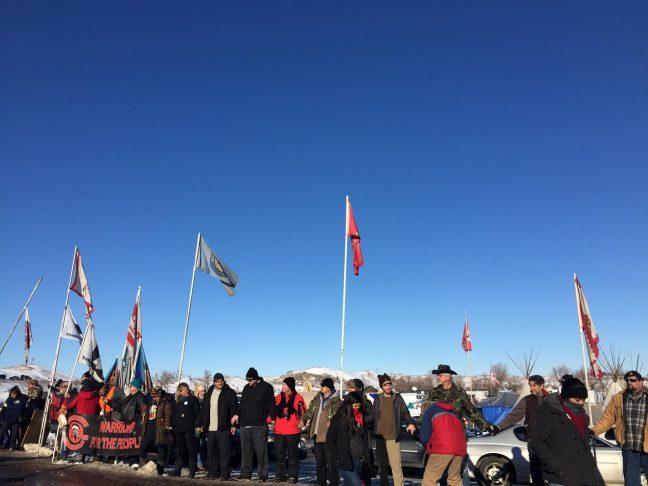As the sun rose over Cannonball River Sunday morning, more than 100 men stood, shoulder to shoulder, lining either side of a dirt road wet with ice. Arms extended, they gripped the hands of hundreds of women, who gently lifted their skirts and slowly descended the hill one by one, clenching a fist of tobacco.
Right, left, right, left. Beaded mittens grasped camouflage gloves, thick boots crunched fresh snow and chapped lips, just barely visible above thick scarves, mouthed the words, “Good morning. We love you.”
Prior to Sunday morning, prayer had never been so crucial.
Nearly an hour passed before the last woman in line knelt at the foot of the river, shut her eyes and cast the last few flakes of tobacco. With the tobacco offering compete, her eyes opened again, and the reflection of two army veterans helping her back up again gleamed in her tears, as her face did in theirs.
Madison community continues to stand in solidarity with Standing Rock
In the hours following at the Oceti Sakowan camp, on the Standing Rock reservation, the force of prayer was palpable. A line of cars waiting for entry extended well into the horizon, some of which carried allies and buckets of supplies, most of which carried army veterans.
On the eve of Dec. 5, the day the Army Corps of Engineers was expected to approve for Energy Transfer Partners an easement authorizing the Dakota Access Pipeline to pass through Lake Oahe and Standing Rock, thousands of veterans came pouring into the reservation from across the country to stand in solidarity with the Lakota tribe on a march scheduled for Sunday afternoon.
Helicopters roared, gauging the immensity of the crowd, as clouds of sage drifted upward to an otherwise cloudless sky. The hum of prayer and song permeated the echo of pounding hearts as water protectors gathered goggles, gas masks and helmets, squeezing each other’s hands. The sun beat down, but the thousands of veterans, environmental activists and allies who had come to stand with the Lakota people were protected under the shade of mounting anticipation.
White women stood alongside Native elders, stood alongside army veterans, stood alongside black children.
When the drum began to play and the elders began to dance, no one understood. When the Chief finally announced to a crowd of hundreds he had received confirmation that the Army Corps of Engineers had denied the permit, sending construction of DAPL to a screeching halt, for a brief moment, no one spoke. When camp broke out into song and dance, no one was alone.
UW student, community members stand in solidarity with Standing Rock protesters
In the days since the announcement, celebration has quietly subsided. While an abundance of click-bait headlines preaching that DAPL has been “forced to reroute,” or that the protestors have “won the fight” have attempted to conceal the truth, the Lakota know as well as Energy Transfer Partners and the federal government that this small victory only concludes one short battle of this grueling war.
Though construction has been temporarily denied, restrictions could face swift upheaval when the keys to the White House change hands in just over a month. Multimillion-dollar oil companies have a way of getting exactly what they want, and the federal government has a way of giving it to them on a silver platter with expedited shipping.
But with the latest news on the supposed “victory” at Standing Rock, the momentum driving this movement has slowed, and the burden of responsibility seems to be sliding away.
There is enormous cause for hope today. In the midst of a moment that has planted a knot of helplessness in the hearts of the strongest people, the denial of the permit is the purest, most invigorating evidence of the power of the people.
On Sunday, celebration took hold of the night. But on Monday morning, well before the sun had the chance to break above the horizon, the Lakota were awake again. Praying again. Planning again. Mobilizing again.
UW students road trip to Standing Rock protest site to feed protestors
This is when we dig our heels into the ground.
Up until now, in many ways, fighting has been easy. Anger is easy, and necessary. Feeling defeated, spouting frustration in a powerfully-worded Facebook status, criticizing lawmakers for their silence and sharing GoFundMe’s comes naturally when it appears that all hope is lost.
What is harder is recognizing that a small glimmer of hope is just that – a glimmer. A symbol that the sun is rising on a better day, that the sum of a million small parts of people across the country pouring their sweat into this movement in whatever capacity they can has amounted to something, but that it’s light will soon dim without nurture.
Now is not the time to settle down. Now is the time to harness how powerful this has made us feel, and bring the fight home, wherever home may be.
The Dakota Access Pipeline, nearly complete, already rips through four states and covers nearly 2,000 miles. But it will have to fight for its life.
So we fight harder for our planet.
Yusra Murad ([email protected]) is a junior majoring in psychology and business.














